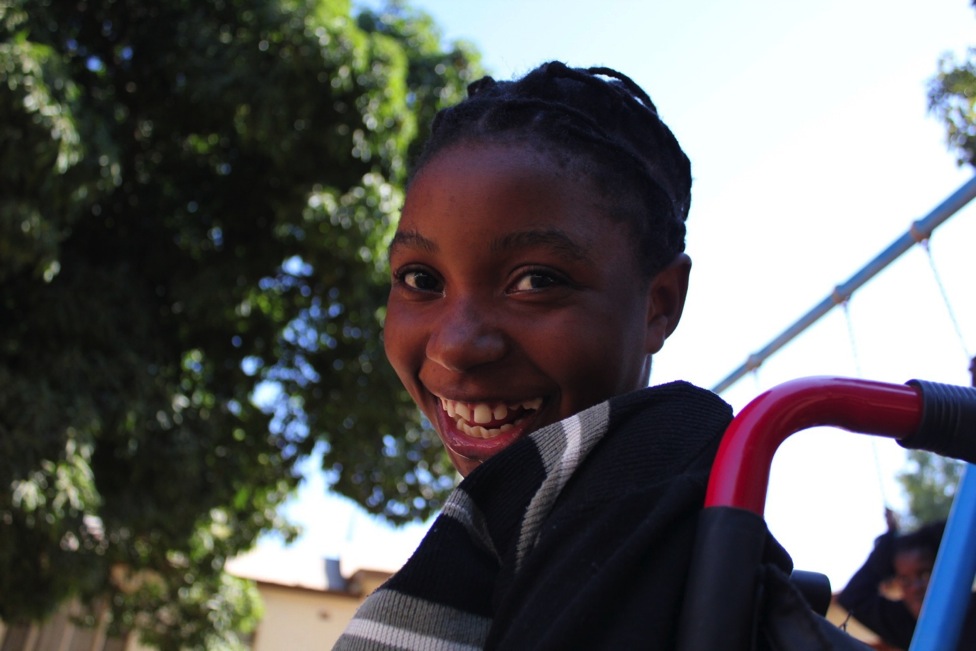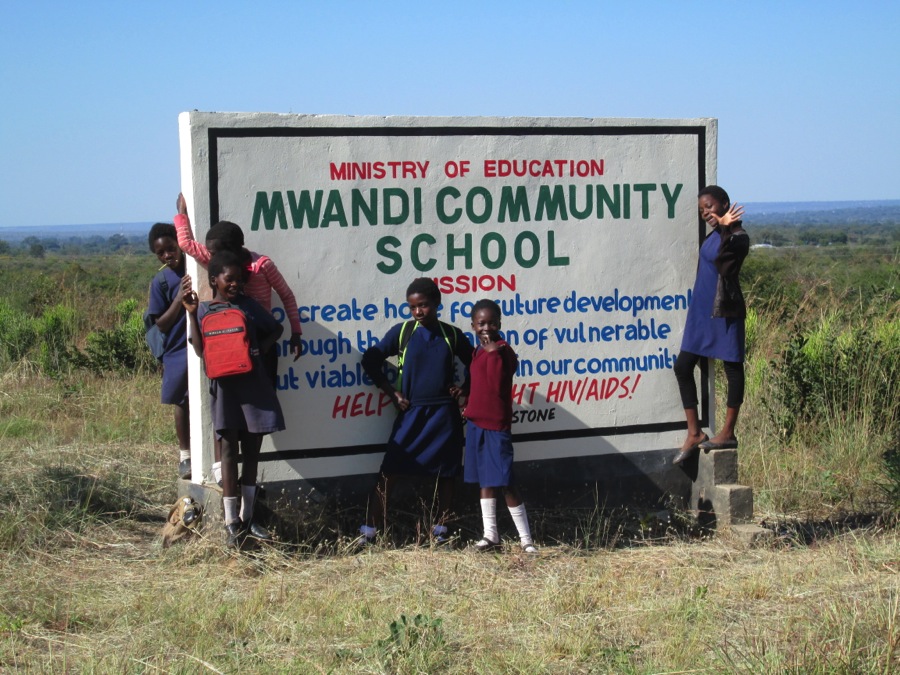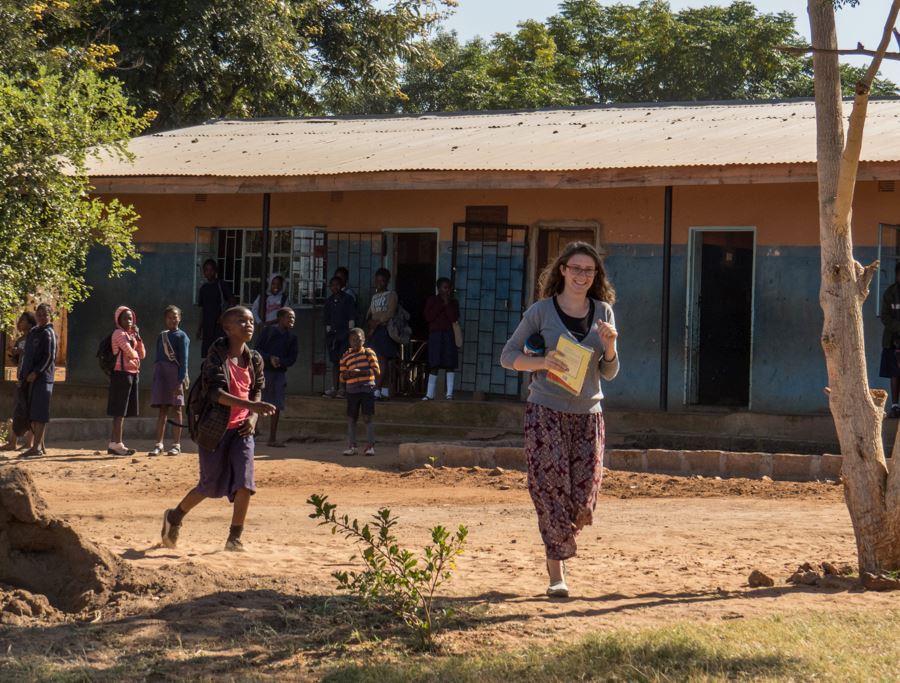Professor Ellen Brinks took a group of students to Livingstone, Zambia this summer. For three weeks, they took part in experiential learning and internships through our Colorado State University Study Abroad program (and African Impact). We asked a few of them to send us pictures and let us know how it’s going, tell us more about what they are doing and experiencing. Here’s the final report from Morgan Bennett, Amira Noshi, and Alexandra Pinion.
~from Morgan Bennett
During our time in Zambia, all of us on the community education projects assumed we were the teachers. That was even the idea that sold me on the idea to travel to Livingstone: teaching and impacting children in a country across the world. Little did I know that going to Zambia would transform me from a teacher into a student.
I entered the 7th grade class at Libuyu Primary School confident in my teaching ability; I have had fantastic education teachers at CSU who have prepared me for anything. On top of that, I have aspirations of teaching middle school students in the U.S. But when you hear a 7th grade class, a group of 11 year olds is probably what comes to mind. That is not the case at Libuyu: the students go to school when their family can afford it. This means that the age range in the class can be from 11 to 19. This can be difficult because students are at developmentally different places in their life, but are all still learning the same curriculum.
Halfway through my duration at Libuyu Primary School, my host teacher, Coastah, told me that 13 of his students could not read. At this point, I was cursing myself for not packing my E402 Teaching Reading Interactive Notebook, Teaching Grammar Through Writing by Keith Polette, and Kylene Beers, When Kids Can’t Read. It was a real frustration for me to have only three weeks with these students who needed help past what my time could give. This was my next lesson as the student. To me, teaching students digraphs seemed a small feat; I felt disheartened that I only had time to teach them so much. But that’s not the point: teaching students what noise “th” makes may be small, but it’s leaps and bounds away from where they were before they learned that. And sometimes life is about the connections and experiences you have, not the amount of information that is learned.
In Zambia, 7th grade is the testing year. This means that at the end of the three terms, students must take a test to see if they can continue their education in secondary school. If the students don’t pass, it will be the end of the road for many of them; schools and families both cannot afford to support that high volume of students in the class for a second year. I learned a disheartening statistic that 77% of students in the Zambian school system will not graduate from secondary school. It hurts my heart, because like the students in America, these children have high aspirations. Many of them want to be doctors, engineers, and teachers: all jobs that are desperately needed, but also require a high level of education. Although it’s hard to know that all of the students in my class may not make it to secondary school, I have the hope that all the knowledge they have learned from their great teachers throughout the years can take them into the future to accomplish any dreams they put their minds to.

~from Amira Noshi
We’ve been back for nearly two weeks now and I think I can speak for all of us when I say, no words can describe our individual experiences. Overwhelmed by the seemingly harmless question of “how was it?” I find it hard to even write about now, having defeated my jet lag and adjusted back into my daily life.
Spending three weeks working in the Cheshire Home, a school for children with disabilities, has changed my perspective completely, being immersed in the daily lives of the inspiring students and teachers of Cheshire homes reminds me to challenge myself in all aspects of life.
The Cheshire Home was conveniently located just around the corner from the hostel, so Katie (my partner in crime) and I could enjoy a nice stroll every morning before starting a unique day. Cheshire Home had two classrooms, separated by grade levels with Charity teaching the older kids and Evelyn braving the younger class. Charity and Evelyn were not only responsible for the everyday lesson plans, but also for administrative duties, and often they were called away from class leaving Katie and I to either continue the lesson or completely improvise the rest of the day.

During these times we really got to know the kids, we learned that Mildred has some pretty sweet dance moves, Mushabati is a math wiz, and Veronica can command a classroom better than Katie and I combined. I experienced a spectrum of emotion while working in Cheshire, with days that were difficult – hair was pulled, faces were kicked, and tears were shed – and I had days where there was no place or group of people that I would’ve rather been or been with, reiterating my changed perspective and reminding me constantly of why I opted to go to Zambia in the first place. We were forced to make due time and time again, and each time Charity, Evelyn, Katie, and I managed to make it work.

Evelyn and Charity were nothing short of inspirations. Both of them demanded authenticity from everyone inside and outside of Cheshire, encouraging the kids and community to face adversity as a team. We witnessed that time and time again, with the donation of food by the religious community of Zambia, allowing Evelyn and Charity to host the braii (barbeque) that provided the funds for a school trip to Lusaka for a nationwide sports competition and again at the braii itself, when Evelyn and Charity (and some of our group members) let loose and fully embraced the ideals that they instill in the wonderful kids of Cheshire.

No words can describe my trip to Zambia. I’ve tried over and over again to find adjectives that manage to condense all the memories created. Replaying them in my head leaves me with a warm sentiment, all the friends we made, all the truly amazing experiences we had, all within a span of three weeks. I think we all as individuals went on this trip for a vast array of different reasons; in the end we all gained so much from the community we both built and dove into in Zambia. No regrets, none at all.
~from Alexandra Pinion
Leaving Livingstone can only be summed up in one word: bittersweet. For the most part, I think we all made Livingstone Backpackers our home away from home. We settled right in, made fast friends with the other volunteers as well as the staff, and shared memories that can’t be easily transposed through writing or simple images that we had taken from our time here. It is something that we share, but we must all be prepared to condense this three-week experience, and to tell our family and friends back home in as much (or as little) detail as we can how we fared in Africa.
What I had gathered from talking with the friends that I’d made was that yes, we were probably ready to go home now, to sleep in our own beds, cuddle our pets and significant others, and relax in the sweet Colorado summer sun, but we were also incredibly sad to leave. There were tears and enough hugs to last a lifetime on that last day, yet I think we all realized that these feelings extended from the strong bonds that we all made during our short time in Livingstone. If only we had a little more time…
I remember the last few days as trying to soak up every bit of my surroundings. During the bumpy van rides, I took mental photographs of the big mango trees (unfortunately for us not yet in bloom), and the clear blue sky, the red dust that got all over everything and that was permanently underneath all of our fingernails, the loveable children that knew no boundaries, the pastel sunsets that somehow merged two opposing colors into something that could ever be captured except by the eye itself. I hugged the kids tightly, feeling a type of warmth and love that I hadn’t felt before with children that were so openly affectionate. I waved joyfully at the locals who seemed so happy to see us. I tried to pinpoint all of the personalities that were so wonderfully welcoming to us.

I think that three weeks was a perfect taste of what it would be like to live on the other side of the world. I know that I can adapt to another place, another climate, another way of life. Those three weeks in Africa affirmed for me that I can and should chase my dreams around the world of teaching and learning from other cultures that I may have had no idea about. My biggest hope is that in the short time I was there I was able to transfer some of my knowledge and culture as well, in order to offer a learning experience to those that so graciously welcomed me and took care of me during my stay.
I’m especially thankful now for social media, because even though I’m a half a world away from the projects and the people I was invested in during my time in Zambia, I can still see how they progress, change, and develop. I can still see the smiling faces of the kids I cuddled and the friends I made and their journeys. It was definitely difficult to leave this temporary home behind, but it was also such a joy to step outside of the airport upon arriving and have my sights filled with beautiful Colorado rolling hills and misty mountains, the green grass contrasting with the dark blue sky. It was difficult to leave behind the short life I’d made in Zambia, but when I saw that landscape I had been away from for so long, I knew that I was home.
